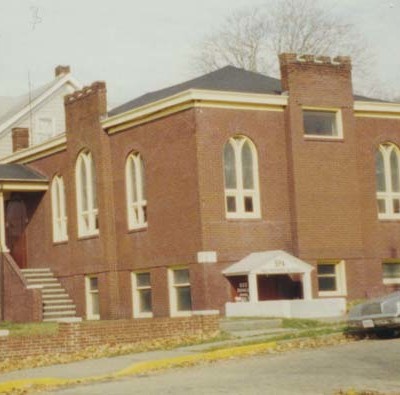
Midland was incorporated as a borough in 1906, when the Midland Steel Company opened its mill along the Ohio River, in western Beaver County. The population of Midland more than tripled in the decade after the Crucible Steel Company purchased the mill in 1911.
Among the first Jews to settle in Midland was Philip Silverberg, who came to the area in 1905 and stayed until his death in 1959. By 1915, the Jewish population of the borough was large enough to justify organizing a congregation. A group officially chartered Sons of Israel Congregation in 1918 with seven trustees, Benjamin Bonn, Ross Deutch, Louis Goldstein, Milton Firestone, Bernard Silverman, Himan Sigal and Philip Silverberg.
Sons of Israel Congregation met in the Midland Borough Building until 1918, when Silverberg purchased a double lot and a frame building at Seventh Street and Beaver Avenue for the congregation to use as its synagogue. The congregation renovated the existing building that year and used it until 1926, when it broke ground on a new synagogue at the same location. At the time of the groundbreaking, the congregation called the new building B’nai Israel Synagogue. Rabbi B. A. Lichter of B’nai Israel Congregation in Pittsburgh came to Midland to dedicate the new synagogue on March 27, 1927. The congregation ceremonially burned the mortgage of the building in 1942.
The American Jewish Yearbook listed a population of 100 for Midland in its 1940-1941 edition. At its peak, the borough had about twenty Jewish families, according to a memoir by Margy Kleinerman in Jews in Small Towns: Legends and Legacies. “Many of the businesses were owned by Jews. If one walked down the main street of Rosh Hashana and Yom Kippur, all the Jewish-owned stores were closed. The stores were open late on alternate Fridays and every Saturday because that was when the mill workers got paid, and the farmers came to town for their provisions,” she wrote. The Jewish community supported a shochet (kosher butcher) for a brief time. After he left the area, observant families instead traveled to Fifth Avenue, in Pittsburgh, for kosher meat.
A group of women in the congregation founded the Ladies Organization in 1915. They changed their name to the Ladies Aid Society in 1927 and the Sons of Israel Sisterhood in 1934. The Sisterhood oversaw a religious school established in 1924 under the auspices of the Southwestern District of Pennsylvania Jewish Religious Schools Program. From 1943 to 1953, the Sisterhood raised funds to significantly renovate the synagogue. The project involved remodeling and enlarging the kitchen, expanding the social room, laying a new floor, installing a new furnace and relocating the entrance to the building.
Aside from the Sons of Israel Sisterhood, two other important Jewish communal organizations in Midland were the B’nai B’rith Lodge No. 1367, which was no longer in existence by 1956, and the Sons of Israel Men’s Club, which was founded in 1953.
Although chartered as an Orthodox congregation, Sons of Israel switched to a Conservative prayer service in 1946. By 1971, several Jewish families in Midland were attending services congregations in nearby Beaver Falls, Pa., and East Liverpool, Ohio, and Sons of Israel could no longer justify opening its synagogue for High Holiday services. Sometime thereafter, Sons of Israel disbanded. The congregation donated its Torah scrolls and memorial plaques to Shaare Torah Congregation in Pittsburgh, other plaques and decorations to the Midland Historical Society at the Carnegie Library of Midland and sold its remaining assets, donating the proceeds to various Jewish causes.